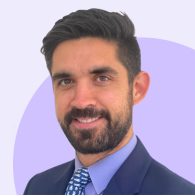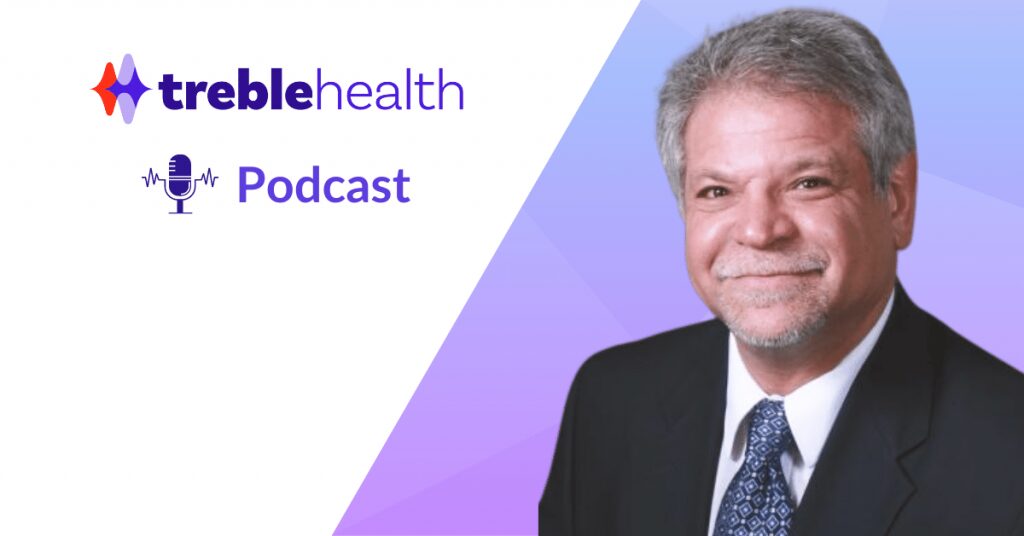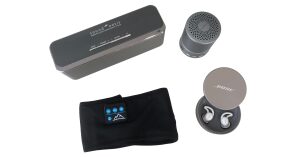For those who suffer from tinnitus, research and new information is almost always good news. The medical community has made leaps and bounds in improving both treatment for tinnitus, as well as devices for aiding tinnitus and hearing loss. Dr. Ben sat down with Dr. Robert Sweetow to discuss where tinnitus research has been, where it is, and where they see it going.
Dr. Ben and Dr. Sweetow on Tinnitus Research in the Last 30 Years
Ben Thompson, AuD.
Hello, my name is Dr. Ben Thompson. This is the Treble Health Podcast, and I am here with a special guest Dr. Robert Sweetow. Dr. Sweetow has a long career in the audiology profession, and he has graciously offered to share his insights over decades of clinical experience and expertise in tinnitus and clinical tinnitus research. We’re going to talk about sound therapy for tinnitus, different cognitive-behavioral approaches, and history of tinnitus treatment devices over the decades. This surely will be a great episode. Dr. Sweetow received his initial degree from the University of Iowa, which is an amazing audiology institution, as well as a Master’s Degree in Communications Disorder from the University of Southern California, as well as a Ph.D. in Audiology from Northwestern University. Dr. Sweetow is a former Director of Audiology and Clinical Professor of Otolaryngology, Ears, Nose, and Throat at the University of California, San Francisco UCSF Medical Center where I was an audiology resident and had a great time as well, after Dr. Sweetow’s tenure there. And Dr. Sweetow himself is a world recognized for contributions that he has made specifically for tinnitus. So happy to have you on Dr. Sweetow. Tell us a bit about where is your attention, where is your focus for the tinnitus patient, what is your message of hope, what is your message of insight and information for our community here?
Robert Sweetow, AuD.
Well, I think that probably my message of hope is that there are many, many approaches to tinnitus, many approaches. And I think that if you look at the literature, they will say that 80% of patients who undergo some kind of treatment will improve. That’s not the same as will be cured, but will improve. And I think that that’s probably a fairly valid statement.
"Treble Health helped me reduce my tinnitus by about 80%, and now I can live my life again!"


"Treble Health helped me reduce my tinnitus by about 80%, and now I can live my life again!"
– Steve D.
Book a free consultation to learn which Treble Health solution is right for you. Join Steve and thousands more who have found lasting tinnitus relief.
I think that it’s essential to understand that there is no one approach that’s right for every patient, there’s no one size fits all for tinnitus patients. And largely because there are so many causes and so many emotional aspects of tinnitus. So I think that the best approach to dealing with a tinnitus patient is to recognize that the audiologist or the therapist or whoever’s providing the tinnitus treatment has to be flexible and the patient has to be flexible. And the patient has to understand that if they improve, it’s because they have done the work. It’s not all about, I know all of us as professionals love to hear the patient say, oh, thank you, doctor, you were so helpful to me, you’ve changed my life. It’s wonderful to hear something like that. But the reality is when a tinnitus patient improves it’s because they’ve put in the work, they’ve put in the adjustments in their life that they need to put in. And I think that the best therapist for them is somebody who will recognize that if one approach doesn’t work, let’s shift to the next approach and let’s not stay with just one thing, which may be a complete waste of time. And which will say to the patient, I don’t really know where we should be going on this. So I think that patients should always understand that they can improve, but it’s going to be really some work on their part with some guidance from the professional.
Ben Thompson, AuD.
And improvements, success, that’s why we do what we do. We’re going towards that place, having a roadmap, having a guideline is something that my team of audiologists tries always to communicate. How do you define success Dr. Sweetow in your years of working clinically and with tinnitus research, how does one define success with tinnitus other than simply maybe a questionnaire or something that is written. How do you define success?
Robert Sweetow, AuD.
You know, it’s a great question. And I mean, I’ve been involved with the development of a lot of the standard written questionnaires and ways to score things and to weigh different aspects of how a person’s dealing with tinnitus. Ultimately, the scores are very nice, you could figure out statistically what is an actual improvement based on a standardized scoring procedure. But ultimately, it’s all about the quality of life for the patient. I mean, if I have a patient who has made very minimal improvement on a test score, but who tells me, you know what, now I can sleep, now I can read, now I’m starting to learn how to enjoy my life. I’m not afraid to go out, I’m not afraid to go to social engagements, I’m enjoying being around my kids and my grandkids. Then they’ve improved. I think that the whole aspect of tinnitus is, you can have tinnitus and not be bothered by it and not feel that this is changing my life. I once had a patient who said I have tinnitus, but it no longer has me. And I thought that was an interesting comment from a patient because their tinnitus didn’t change. And I did emphasize to my patients that it’s not about the perceived sound that you are perceiving it’s about, is it changing your life in a negative manner? If it’s changing your life in a negative manner, you should do something about it. And if you could get to the point where it’s no longer changing your life in a negative manner, you’ve made the adjustment that needs to be made. And so I would consider that an improvement and a success.
Ben Thompson, AuD.
Love that, and hearing you talk about that, it makes me think of all the people that I’ve been involved with, who when they are better, you can tell, you can tell. They’re feeling better, they’re doing things they used to do, feeling like they’re old self again. So that is very possible, I’m in line with your message of hope there. I want to ask you a question that I can’t ask every guest, which is to help us understand the different products for tinnitus that have been researched, created, manufactured over the last number of decades that are designed specifically for tinnitus treatment. And when you were working clinically for many years in San Francisco, California, how did that impact your patients, and what were these different generations of products always improving or iterating?
Robert Sweetow, AuD.
Yeah, again, a very interesting question. And there have been so many products that have come out. I began my work in tinnitus in I think around nine, I received my PhD from Northwestern. And in fact, my professor, my mentor from Northwestern was the father of audiology, the most famous audiologist of all time, fellow by the name of Raymond Carhart. And I remember saying to him that I was interested in tinnitus and I wanted to do my dissertation on it. And he told me, he said, “If you do your dissertation on tinnitus, you’re going to be here for the next 10 years.” He said, “And I don’t think you want to be here in cold, snowy Chicago at Northwestern for the next 10 years.” And he said that because, there are so many variables involved that the tinnitus patient has to deal with. And that the researcher would have to deal with, in order to do a proper, valid, reliable, scientific study. So at the time that I began in this, there were no products per se. The people have talked about, well, you know, back in the ancient Greek days about the word tinnitus had come out and there were things, of course, everybody thought anybody who had tinnitus was crazy, which of course, we now know is not the case. But at the time I began in this, probably the most well known researcher in tinnitus was a fellow by the name of Jack Vernon, who was working up in Oregon. And in fact, Jack Vernon made tremendous contributions to the field, mostly in terms of getting professionals to be involved with treatment. Prior to what he was doing, there were very few professionals who would work with a tinnitus patient. Many ear, nose, and throat doctors would throw up their hands and say, I don’t know what to do for you, you just have to learn to live with it, which is a terrible thing. And I’m sure this in every one of your podcasts that comes up, it’s terrible thing to say to a patient that you just have to learn to live with it. Our job as professionals is to help them to learn to live with it. So Jack Vernon went back and looked at some of the early work on tinnitus that was done by researchers. And recognized as did people back in ancient times, that other sounds that were really coming from the outside could interfere with a person’s perception of their tinnitus. And so he developed and really worked on the whole concept of masking or covering up a person’s tinnitus perception by using another sound. And he had developed very specific procedures for matching the tinnitus and then providing a sound that would interfere with the person’s perception of tinnitus. So the first instruments that really came out to help a tinnitus patient were these devices that just produced a narrow band of noise that was centered around the pitch of somebody’s perceived tinnitus. And they were called Maskers. And at first, when that came out, there was tinnitus research that was done, primarily coming out of his labs.
But research that was saying, this will work on 80% of the patients. Well, myself and other researchers at the time who got involved in this, recognized that it didn’t work on 80% of the patients it did work on many patients. Many patients found this to be of use. But then they would also, you would have a significant number of people who would come back and say, well, all we’re doing is substituting one sound for another and so I’m still being bothered by the fact that I’m hearing this one sound. So the Maskers didn’t work for everybody. People then realized, well, you know, hearing aids also could serve a purpose because not only would they help to mask the tinnitus, but they would also have a tendency to reduce the brain’s need for receiving sound that they weren’t receiving because of their hearing loss. And so hearing aids became a popular approach and remain to this day, perhaps the most popular of the instruments to use for a patient. And it’s largely because it’s attacking more than one problem. It’s attacking the hearing problem. And you know, anybody with a hearing problem recognizes the effect that it can have on your daily living. And so by using hearing aids a lot of people realized, well, I’m not hearing the tinnitus as much. That’s an improvement and I am hearing a lot better and I’m able to socially engage a lot better. So those improvements, so it made hearing aids a very viable instrument, and to this day. And then after that came various devices that would, and there were a wide variety of them that would use music, that would use different tones, that would use a broad band of frequencies, that would even bedside approaches, that would use birds tweeting and waves crashing and things like that. So a number of approaches came out. There was an approach that we tried that was using beats where the sound would kind of go back and forth in your head. And people felt that that might be of some use. You know, one of the biggest things that happened, was when patients started well, not patients, when professionals started to realize that tinnitus was coming from the brain. Regardless of where it was originating, which was probably more often than not in the ear or in the jaw or in the neck. Once professionals realized that ultimately this was coming from the brain. And I’m sure you know it’s been mentioned in your podcasts. That the very simple concept of cutting the nerve that runs between the ear and the brain would leave a person as deaf as my desk, but would still leave them with the perception of tinnitus made everyone recognize that this is coming from the brain. And all of the MRI studies, and different advanced studies that are done today, have of course verified and have even pinpointed where in the brain tinnitus is coming from. So many of the instruments now, are geared towards attacking the brain or are geared towards trying to distract the patient or to mix the signal with the patient. I don’t think that there’s, in fact I know, one of the few things I do know for sure about tinnitus is that there is no one instrument that’s going to do it. And I think that the idea is to try a lot of different kinds of instruments that may be of benefit to the patient and let the patient realize that, we’re going to try a lot of different things here. Maybe we’ll hit it right on our very first thing. And if we do, that’s great, but if we don’t, don’t be bummed out, we’re going to try something else. And we’re going to keep trying until we can find something that is of benefit for you. But I think that also it’s so essential that the patient understand that the instrument is that, using any kind of sound therapy or any music therapy or anything, it’s a vehicle to get the brain to the point where it gets the message that, I’m not going to let the tinnitus alter the quality of my life. That’s the goal. It’s not the goal of knocking out the tinnitus, it’s the goal of I’m not going to let this affect the quality of my life.
Ben Thompson, AuD.
And from what I’m seeing the protocols, the approaches, the best practice, it’s still based on habituation of the brain plasticity, able to reduce the perception and go from bothersome tinnitus to non-bothersome tinnitus. And from my experience, usually along that journey, the sound gets softer too, does not need to go to zero, but it usually gets softer too. Would you agree with that overall statement that during the habituation process the sound usually gets somewhat softer too, or not always?
Robert Sweetow, AuD.
Yeah, I mean, I think that the perception of the tinnitus gets softer. I never like to call tinnitus a sound ’cause it isn’t really a sound. But I think that the perception gets softer, but I’ve never been convinced that the actual production of the tinnitus has changed. I think it’s a matter of the person’s attention has changed to it. And the person has placed it as, you know, people talk about with tinnitus retraining therapy that they’ve assigned a different meaning to it. And the meaning that they’ve assigned to it is no longer one that is at the forefront of their consciousness, that is the most important thing going on. It’s not the most important thing, it shouldn’t be the most important thing going on. So I think as a person gains that perspective, it allows their brain to not focus on the tinnitus. And that in itself would reduce the apparent intensity or magnitude of the tinnitus.
Ben Thompson, AuD.
Yeah, it’s a good point because when I’m helping patients, when our team at Treble Health is helping patients, we’re asking them at the beginning some important metrics. How often do you think of it, what percentage of the day do you think about it? That’s the awareness level. What percentage of the day are you bothered or annoyed by it, and then how would you rate the volume subjectively from one very, very soft to 10 very, very loud? People typically do when they’ve habituated report that their volume from one to 10 is better. And so that would, that seems to be it’s softer, right? Well, what we’re introducing here is a more sophisticated look into, well, the brain activity of that tinnitus maybe about the same, but the way the deep brain is interpreting the sound can change and that leads to this shift from one to 10. So it’s subtle important points to bring up.
Robert Sweetow, AuD.
Yeah, and I think that the most important point that you just bring up is the fact that this is subjective. The same loudness, you know, loudness as a psychological construct. I remember being involved in some work, a long, long time ago, that we looked at how a person perceived the loudness. We took two groups of people. We took a group of people who loved classical music and we took a group of people who loved hard rock music. And we played them these two music passages at exactly the same intensity level, same physical intensity level and very high. And we asked the subjects in this experiment, which one was louder, which one was too loud? And the people who loved classical music consistently said the rock music was too loud. And the people who loved the hard rock music consistently said the classical music was too loud. So loudness is a psychological construct, not a physical construct. And as a result, I agree with you completely that as a person who habituates to the tinnitus, they would then assume that the loudness of the tinnitus has dropped.
Ben Thompson, AuD.
Hmm, yeah, so important, so important, and why because, individuals who are listening that have tinnitus are coming to this information, searching online, going to their doctor to reduce this intensity of the signal. So it’s important to define success and talk about these details so that someone who’s listening, you can manage your expectations, have a timeline. I had a patient once tell me they said, you know, Dr. Ben, what you’ve done for me is great. You’ve given me a roadmap to this very challenging condition. Now, I’m still struggling day by day. Some days I have better days than others, I’m getting better, but simply to know what to expect and to have a guide and a roadmap is key.
Robert Sweetow, AuD.
Yeah.
Ben Thompson, AuD.
Do a lot of your patients in years past or share a similar sentiment?
Robert Sweetow, AuD.
Yeah, and I think that’s a really good point. And I think that that is what the professional is doing. The professional is a guide. I always emphasize to my patients that number one, this is going to take time and maybe we will get to the place where you’re satisfied quickly, but it may not get there quickly, but I’m not going to give up on you. But I also want you, the patient to understand that when you succeed, it’s on you, you’re the one who has succeeded. All I’ve done is I’ve guided you in the direction that I’ve learned from reading papers and seeing other patients and hearing other experts in the field. But ultimately, the success or failure of any approach that we do is going to be up to you. So when you succeed, you pat yourself on the back rather than me. But, and this is always tricky on how you would say this, but if you don’t succeed, I don’t, it’s not really fair for you to say, oh, you screwed up for, you didn’t help me Dr. Sweetow. My job is to guide you, iis to give you, like you said, the roadmap to get there. And recognize there’s going to be peaks and valleys. And it’s really important to not get too high during the peaks and not get too low during the valleys. To recognize that the progress that we’re going make, is not going to be linear, it’s not going to be straight across that we could measure. There are going to be things that happen in your life that adversely affect the tinnitus. And that’s not because of the tinnitus. Stresses in your life will adversely affect it. If you don’t feel good it’s going to adversely affect it. If you’re not sleeping well it’s going to adversely affect it. If you’re having trouble at work or trouble in your marriage it’s going to adversely affect it. And that’s not on the tinnitus, that’s part of life. And then there are going to be days when you say, wow, I don’t hear my tinnitus at all today. And you’ll get really elated about that. But I would warn the patient, don’t get too elated about it because this progress is going to go up and down, but we just want it to go gradually up ultimately, and to the point where you’ve habituated.
Ben Thompson, AuD.
Yeah, that’s excellent. I wanted to ask something that, maybe only you and a few others can answer. You’ve managed a large university, hospital, clinic of audiologists, and you’ve had close relationship with ENT Doctors. What are some tips you would have to the patient to navigate this space of, should I go to an audiologist, should I go to an ENT Doctor, should I go to a psychologist, who’s going to help me? I go to one doctor in my local town. They give me a test they tell me, this is what I know and go figure it out. What’s your message for how to get the best care possible?
Robert Sweetow, AuD.
Well, I think that first of all, you know, I think that university clinics, clinics that have more than one person tend to be better for a tinnitus patient. Because I think that there’s the opportunity for the professionals to collaborate with each other, to share each other’s experiences. I think you have to start with the ENT. You know, I don’t think there’s any way around it, even though many ENTs have a pretty superficial knowledge of tinnitus to be honest. You have to start with them because there’s a good chance that the tinnitus is being caused by something that might be cured. And if you’ve got that possibility, that’s where you want to be going. So I think you start with the ENT. I think the ENT who says, there’s nothing you could do about it, learn to live with it, is not a good tinnitus person for you. I think at that point you need to find if there are audiologists in the area who can deal with this? I think more audiologists have gotten involved than the long term care of a tinnitus patient than the physician. ‘Cause the physician, if they can’t give you a medication or surgery, they’re not going to spend the time working with you. They don’t have, and it’s not their fault, they don’t have that time.
Audiologists who work with tinnitus patients have carved out that time in their practice to be able to work with the patient. And I think that a psychologist is an important addition to it. In my approach on tinnitus again, one of the first papers I ever wrote on tinnitus had to do with the cognitive aspects, the thinking aspects of tinnitus. And the reason that I thought about it was because I was reading about how cognitive therapy works with patients who have chronic pain. And in a sense, chronic pain is like tinnitus. It’s invisible, it’s there most of the time, and different people have different thresholds of what they could handle and of how something would impact them. So I think that there are organizations like the American Tinnitus Association, the British Tinnitus Association, that are good places to start. ‘Cause if you go online and look at, they might be able to say, well, here are the audiologists or here are the physicians that we know of that have worked with tinnitus patients. Seeing a professional who’s never seen a tinnitus patient and expecting them to be able to really help the tinnitus patient is tricky, because they’re not going to know the different pathways and the different roadmaps that might benefit the patient. And I think it’s essential in talking to a tinnitus practitioner, a tinnitus professional to say, what kinds of approaches do you use? And it’s my personal opinion that if their approach is one single approach, that’s not the person I would want to deal with if I was the patient. I want to deal with somebody who has multiple tools to try to help me.
Ben Thompson, AuD.
Totally agree, totally agree. And as a professional, we are training with specialists who say, this is the way. And then we’re also training with other specialists that say, no, this is the way. And those of us, I would say myself and our team are taking bits and pieces. I look at it like a three legged stool with cognitive tools, sound therapy and mindfulness, all playing a very important and complementary role. You don’t have to choose one or the other people, we want all of them.
Robert Sweetow, AuD.
Yeah.
Ben Thompson, AuD.
In your own unique way, because not everyone will try mindfulness in the same way and not everyone wants to use sound therapy in the same way so.
Robert Sweetow, AuD.
Yeah, exactly.
Ben Thompson, AuD.
It’s been an excellent discussion, Dr. Sweetow. Personally, I want to say thank you, for those of you who may not know, my mentor at UCSF is Dr. Troy Cascia. Dr. Troy Cascia was trained under Dr. Robert Sweetow. So this is a multi-generation approach to what is the best possible treatment for tinnitus, how can we give the best service, how can we reduce tinnitus as much as possible? That’s why we’re all here. So Dr. Sweetow, thank you so much for the work that you’ve done and the tinnitus research you’ve done. It has certainly paved the way for professionals like myself to continue helping tinnitus patients.
Robert Sweetow, AuD.
Yeah, well, thank you, that’s kind of you to say now, so I’m kind of like your grandfather, your grand mentor then I guess.
Next Step: Book Free Consultation
- 75% of patients reduced their tinnitus within three months after following our recommendations.
- "I feel like Treble Health literally gave me my life back." - Randy S. (verified customer)
- Join thousands of people who have reduced their tinnitus after scheduling a free consultation.
Ben Thompson, AuD.
Would you please accept my offer to be my grand mentor? You have no choice, you have no choice in the matter.
Robert Sweetow, AuD.
I will and I will look forward to getting nice presence on my birthday and things like that for my grandson.
Ben Thompson, AuD.
All right, that sounds lovely. Thanks again, Dr. Sweetow.
Robert Sweetow, AuD.
Okay.
Ben Thompson, AuD.
And for everyone watching, please remember to check out our other episodes on the Treble Health Podcast. And if you are interested, we have a Telehealth Service available to have conversations and consultation with an expert tinnitus audiologist. Thank you so much, bye, bye.
Robert Sweetow, AuD.
Okay, bye, bye.
Next Step: Book Free Consultation
- 75% of patients reduced their tinnitus within three months after following our recommendations.
- "I feel like Treble Health literally gave me my life back." - Randy S. (verified customer)
- Join thousands of people who have reduced their tinnitus after scheduling a free consultation.


















